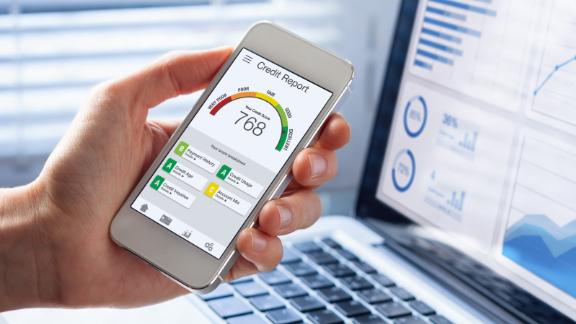When you’re applying for credit, whether it’s a mortgage, a personal loan or a credit card, your lender will almost always look at your credit score. But what exactly does your credit score mean, and what’s a good credit score versus a bad one?
Before we get into good credit scores versus bad scores, it’s important to understand what a credit score actually is. Basically, a credit score is your entire credit report boiled down into one easy-to-reference three-digit number. It includes almost everything on your report, such as the number of open accounts, the types of accounts, your payment history, how often you’ve tried to get new credit and so on.
Credit scores typically range from 300 to 850, but not always, and that brings up an important point — not all credit scores are the same. There are many different ways to translate the information on your credit report into a simple three-digit number, so there are many different credit scoring models, which are the algorithms that decide how to calculate that one number.
The most well-known and widely used credit scoring system is called FICO, named after Fair, Isaac and Company, which invented it. A second competing system known as VantageScore is also sometimes used by lenders and other companies analyzing your credit.
Monitor your credit with these credit score offers.
While both systems use a range of 300 to 850, they differ on what constitutes a good credit score. So when determining whether your credit score is good or bad, it’s important to know which credit scoring model your score comes from.
With all that in mind, here’s how a typical FICO credit score breaks down:
- Excellent: 800 and higher
- Very good: 740 to 799
- Good: 670 to 739
- Fair: 580 to 669
- Poor: 579 and lower
The tiers of a VantageScore credit score are slightly different and look like this:
- Excellent: 781 and higher
- Good: 661 to 780
- Fair: 601 to 660
- Poor: 500 to 600
- Very poor: 499 and lower
As you can see, there’s a lot of variation between the two competing systems. A FICO credit score of 600 would be rated as “fair,” but a VantageScore of 600 falls into the “poor” category. On the other hand, a VantageScore credit score of 785 would be considered “excellent,” while the same score would be deemed just “very good” in the FICO system.
And even within these two broad credit scoring systems, there are dozens of different models that focus on various aspects of your credit, and you’ll get a different credit score from each model. Some models can even have a scoring system that varies from the typical 300 to 850 range.
Check your score now and keep an eye on your credit with these offers.
However, the most important factor is what your lender considers to be a good credit score. Lenders can internally use a variation on the above tiers, and while one bank may offer its best interest rates to people with a FICO credit score of 720 and above, another lender might only provide those top rates to folks with credit scores higher than 740. Plus, a lender will also take other factors into account beyond your credit score, such as your income and existing monthly debt payments.

In the end, don’t panic too much about whether your credit score falls into the “very good” or “good” bracket. The key is knowing roughly where you stand, then working to improve your score. Your credit score changes every time there’s a change to your credit report, so using your current credit responsibly can drive your score higher in a relatively short amount of time.
And before you start applying for credit anywhere, it’s vital to know your credit score. If it’s lower than you think it should be, you’ll want to take a close look at your credit report to see if any of the information on it is incorrect. It’s not uncommon for credit reports to have the wrong data, and with so many data breaches in recent years, it’s also possible for fraudulent accounts to appear on your report if your sensitive personal information has fallen into the wrong hands.
So, if you’re considering opening a new credit card or refinancing your mortgage, take a moment to check your credit score and get an idea if you have good credit or bad credit.
Get access to your credit score and credit report for little to no cost with these offers.
Read other stories in our “Myths about credit” series:
Looking for a new credit card? Read CNN Underscored’s guide to the best credit cards of 2020.
Get all the latest personal finance deals, news and advice at CNN Underscored Money.
"What" - Google News
August 28, 2020 at 05:01AM
https://ift.tt/3loSgGL
Myths about credit: What's a good credit score? - CNN
"What" - Google News
https://ift.tt/3aVokM1
https://ift.tt/2Wij67R
Bagikan Berita Ini














0 Response to "Myths about credit: What's a good credit score? - CNN"
Post a Comment